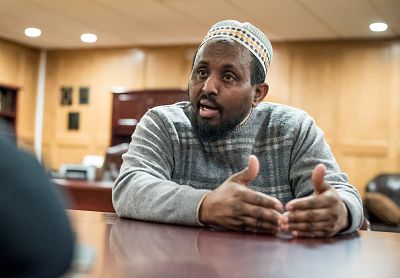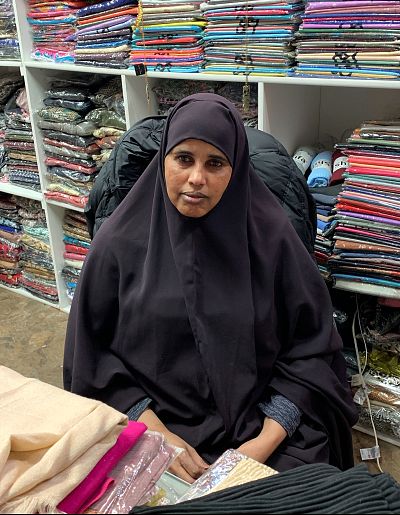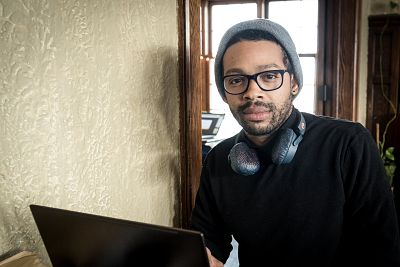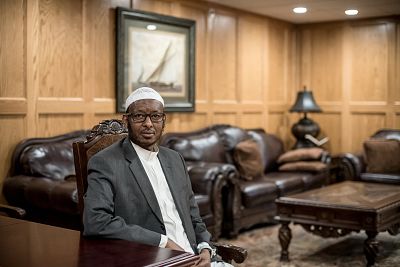Voters in Minnesota's 5th Congressional District, including Muslims and Jews, spoke to NBC News about the freshman lawmaker's comments.
MINNEAPOLIS — Rep. Ilhan Omar's comments about Israel have consumed Washington. But here in Minnesota's diverse 5th Congressional District, a pillar of progressivism that handed Omar a decisive victory in November's midterm elections, there has been far less outrage.
In interviews here, including with residents who are Jewish and Muslim, few of Omar's constituents voiced any anger at the lawmaker, even if they found the remarks troubling. One Jewish leader said she would be open to a good-faith foreign policy debate.
To the director of the Dar Al-Farooq Islamic Center, a large mosque 10 miles south of this city, the furor is overblown.
"Anti-Semitism is real in this country," Mohamed Omar, who is not related to the freshman Democrat, said in an interview in a private study, as children nearby hurried to Friday afternoon prayers. But the controversy, he said, is a "distraction."
In the nation's capital, Ilhan Omar drew an intense backlash for a tweet that suggested American support for Israel was "all about the Benjamins baby" and a remark that pro-Israel activists pushed for "allegiance to a foreign country." She was accused by some lawmakers and prominent Jewish groups of anti-Semitism and playing on toxic anti-Jewish stereotypes.
In response, the House of Representatives last week overwhelmingly approved a resolution condemning all hate, though the measure did not single her out. Omar, for her part, has apologized for suggesting that the United States' connection to Israel is driven by money from AIPAC, a prominent pro-Israel lobby group.
Rabbi Marcia Zimmerman of Temple Israel, a Reform Jewish congregation that is the oldest synagogue in this city, said many of members of her community have called her over the last month to say they were troubled by Omar's comments.
"I don't know the intention, but I know the impact. The words have been hurtful," Zimmerman said in the tranquil lobby of the 141-year-old temple, surrounded by 12 floor-to-ceiling windows that symbolize the Torah's 12 tribes of Israel. She added that the comments are especially problematic amid a recent spike in anti-Semitic incidents nationwide.
Still, Zimmerman said she is open to differing opinions about Israel policies and the Israeli government.
"If she wants to have a conversation about lobbyists and money, let's have that conversation," Zimmerman said. "If she wants to have a conversation about the Israeli-Palestinian conflict, let's have that conversation."
But, the rabbi added, "in my mind, tweets are not the way that you communicate complex, complicated issues when you are a member of Congress."
The mood at home
Minnesota boasts the largest Somali-American community in the U.S. — about 70,000 people, according to a Census Bureau estimate — and a robust community of Somalis live in Omar's district, which covers Minneapolis and some of its suburbs. The district is filled with immigrants like Omar, a refugee who fled a Somali civil war with her family and sought asylumin the United States in 1995.
Her district is also reliably blue. Hillary Clinton got 73 percent of the vote here in 2016, and Omar took close to 80 percent in November. She became one of the first two Muslim women elected to Congress, taking the seat previously held by Keith Ellison, the first Muslim man.
Anab Ibrahim, the owner of a women's boutique at the Village Market, a bustling Somali shopping mall where women admire brightly colored dresses and men line up for haircuts, said she was "very happy" about Omar's history-making election and believes the congresswoman is a "good worker" who will stick up for low-income people.
Ibrahim, 54, a Somali-American, was disturbed when she learned that a death threat against Omar had been scrawled on a bathroom stall in Rogers, a city northwest of the Twin Cities.
"She said an apology," Ibrahim said, referring to Omar, "and I think it should be accepted."
Abdulahi Farah, 38, a Somali-American volunteer at the mosque, said that anti-Semitism is unacceptable, but added: "If someone wants to criticize an entity — whether it's AIPAC or the Israeli government or the NRA or the Saudi government — what is the problem?"
But not all Muslims in the area were as forgiving. Khalid Awda, 48, an Iraqi-American who served as an interpreter with the U.S. Army from 2006 to 2012, including a yearlong stint attached to the Minnesota National Guard, said he perceived Omar's comments to be anti-Semitic.
"I feel shame," said Awda, who said he was not able to vote in November.
"She does not represent Islam. She just represents herself," Awda said, adding that he feared those who were offended by Omar's words would also find fault with his wife and daughter simply because they, like the congresswoman, wear hijabs.
#embed-20190308-minnesota-5th-district iframe {width: 1px;min-width: 100%}
Two miles west of the Somali mall, young professionals sipped coffees and ate lunch at The Lynhall, a trendy restaurant where Omar held a meet-and-greet eventduring the campaign. Luke Shors, 42, an entrepreneur who lives in the district, said her language might have been over the top, but he was sympathetic to her foreign policy platform.
"I do think there's value in having someone in Congress who can help give a voice to the Palestinian people, who historically have not had much political capital or representation," Shors said.
At Bordertown Coffee, a nonprofit cafe inside a former University of Minnesota fraternity house and adjacent to the campus Hillel center, Zeke Joubert said he was "not riled up" about the comments.
"I feel like as a citizen, as someone she represents, she is encouraging us to challenge and think about the way ... our international politics works," said Joubert, a 34-year-old graduate student.
He said he believed the House resolution, which condemned all "hateful expressions of intolerance," was a "waste of time" that did nothing to address what he described as "the materialities of racism," such as the water crisis in Flint, Michigan.
"We want to hold everyone accountable," said Rae Young, 22, a at the University of Minnesota who sat at Bordertown with a copy of "Maus," a graphic novel about the Holocaust.
"If there's Jewish folks in your community who think you're making anti-Semitic comments, then that's a problem," Young said. "But if someone is accusing you of making anti-Semitic comments because they don't like you as a woman of color, then that's also a problem."
'She looks different ... worships different'
The Minneapolis area is all too familiar with the consequences of racial and religious hatred. In August 2017, the Dar Al-Farooq Islamic Center was bombed. The three men charged in the attack were members of an Illinois militia group that called itself the White Rabbits.
No one was killed, but the blast shattered windows and destroyed part of the imam's office, frightening worshippers and local religious leaders. The center's leaders repaired the physical damage, but the trauma lingers.
"It's kind of like being in a dark room, and someone might hit you at any moment, but you don't know where it's going to come from," said Farah, the volunteer at the mosque, which sits just outside Omar's district in Bloomington and counts many of her constituents as members.
Hassan Jama, an imam who leads prayer services at Dar Al-Farooq and other mosques across the area, spent much of last fall campaigning for Omar, organizing get-out-the-vote efforts.
Jama, who is also executive director of the Minneapolis-based Islamic Association of North America, said he believes the "political climate" in the United States is Islamophobic, and that his congresswoman is the target of so much scrutiny because "she's different."
"She looks different, she speaks different, she dresses different, and she worships different," he told NBC News. "But, luckily, she is in America, and she has a voice, and she's serving the people who elected her."
He dismissed the uproar around Omar — "I don't believe that's anti-Semitism. I don't believe she hates Jews" — and said he knew of many Jewish people in the district who voted for her.
Mohamed Omar, the executive director of Dar Al-Farooq, has wrestled in recent days with Omar's comments and noted she's hardly the country's main source of division.
"We have a president in the United States ... who normalizes people who are literally embracing anti-Semitic behavior, people who are chanting 'Jews will not replace us,' and he's saying there's fine people on 'both sides,'" Mohamed Omar said, referring to the 2017 marches in Charlottesville, Virginia.
"Eleven Jewish people died in a synagogue," he added, referring to the shooting at the Tree of Life synagogue in Pittsburgh in October, "and the country didn't react like the way they're reacting to Ilhan."















